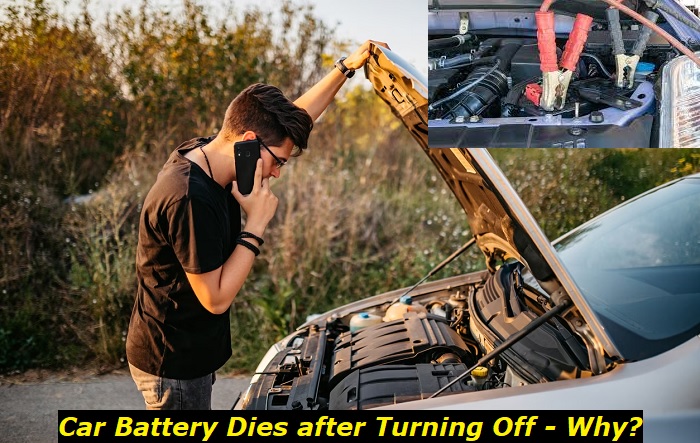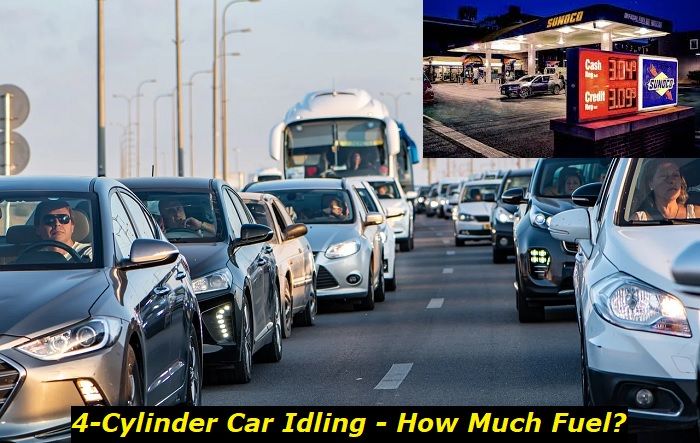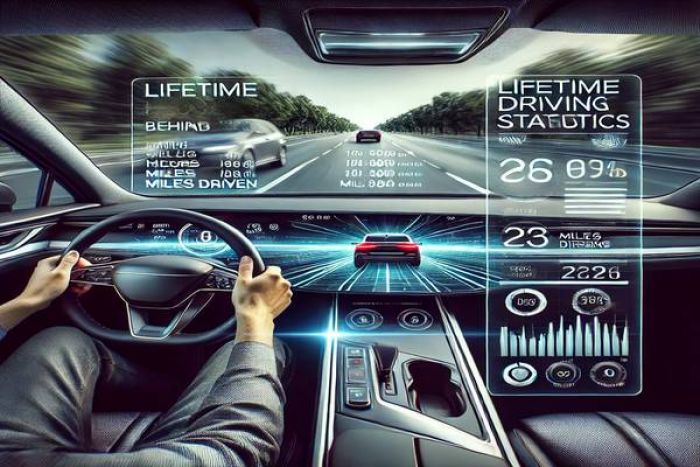If your car battery dies after turning off your car, it could be due to a parasitic drain, weak battery, faulty charging system, Faulty BCM, bad alternators, chargers, etc. To fix this problem, you'd have to diagnose and eliminate the cause of your vehicle's parasitic drain or fix the alternator/charging system of your car.
Dead car battery highlights
- Average lifespan:4 - 5 years
- Voltage range:less than 10 volts
- Symptoms:no crank, no lights
- Reasons:complete discharge, age, hard use
- Prevention:regular charging
- DIY fix:possible
- How much to fix?$0 - $250

8 Reasons Why Your Battery Dies Even When The Car Is Turned Off
1) Weak battery
If you have a weak battery, it may simply break down completely after an initial run. And so, if you notice that your battery dies right after turning off your car, it could be that it was already very weak/drained to begin with.
2) Parasitic drain
Just the way certain parasites in the human body can suck blood or other bodily fluids, that's the same way certain components in your car can suck battery power until there is nothing left. When this happens, it's called a parasitic drain.
Here are a few things that can cause parasitic drain:
- Leaving the headlights on
- Leaving interior lights on
- Leaving your phone or any other electrical component plugged into the cigarette lighter (auxiliary power outlet)
- Electrical faults.
Let's discuss these types of parasitic drainage in detail
- Drainage from lights
Let's say you left your headlights on overnight. By morning, you'd likely have a dead car battery.
The same goes for interior lights. In short, car experts always advise not to leave exterior or interior lights on for more than six hours. So remember this next time you're in a hurry or returning from a party.
- Drainage from cigarette lighter
It is never advisable to leave things plugged into your car's cigarette lighter, even when your car is turned off. Doing so will drain your battery over time.
Note that most modern cars automatically shut off power to the cigarette lighter when you turn off the ignition. In these cars, drainage won't occur even if there's something plugged in. However, other factors, like bad fuses, can cause parasitic drainage.
- Drainage from bad fuses and electrical components
A blown or malfunctioning fuse will most definitely cause parasitic drainage in your car. This happens because bad fuses lead to an open circuit that draws energy, even when the car is off.
- Drainage from electrical faults
Parasitic drains can also happen if there is an electrical fault. For instance, a malfunctioning radio or car light system may continually draw current from your battery even when the car is turned off.
Unfortunately, not all cars come with warning/alert features for the vehicle's electrical system, and this makes most parasitic drains go unnoticed.
3) Car Charging System is faulty
Your car has a default means by which it recharges your battery. This process occurs while driving, as the alternator generates power for the entire vehicle.
However, just like any other car system, faults can arise with your vehicle's default charging system. As a result, your battery will be charged very slowly or won't even charge at all. Ultimately, you'll find your car battery dead when you finally turn off the engine.
4) Faulty BCM
A Body Control Module (BCM) is the computer that controls the entire electrical system of your vehicle. It stays connected to the battery at all times, constantly drawing little amounts of electric power from it.
However, if a BCM becomes faulty, it would draw more power from a battery than is required, draining it faster than usual. Not all cars use a BCM. But if your car does use one, then you should be suspicious about it and carry out the necessary troubleshooting.
5) Battery cable or terminal problems
Your battery terminals and cables must be perfectly OK for power to flow from your battery to the necessary parts. Over time, battery terminals get loose or corroded. This hinders current flow and can also make the battery lose its charge over time.
Additionally, corrosion can make a battery leak, thereby creating a short circuit that can drain your battery even further. Corrosion of battery terminals is caused by electrolyte vapors, overcharging, or old age. It's advisable to check battery terminals every 2 to 3 months.
6) Short trips
If you're fond of making short trips with your car, you're doing the battery more harm than good. You see, it takes quite a substantial amount of battery power to crank up your engine for ignition. That battery power must be duly replenished by the alternator and vehicle recharging system during a car drive.
However, if you take consecutive short trips, you keep drawing huge battery power, yet your car doesn't have enough time to replenish your battery. At a point, your battery will die out, leaving you stranded.
7) Bad Alternator
Your alternator is meant to work hand-in-hand with your car battery. While the battery is needed primarily for ignition, the alternator is needed to power all the electrical components while your car is in motion.
Alternators generate power using mechanical energy. This generated power is used to power your entire vehicle and recharge your battery while driving.
If your alternator is bad, this entire process fails, and your car will drain power from your battery without charging it. As a result, you'll be left with a dead battery. Apart from a dead battery, other symptoms of a bad alternator include flickering lights, growling or whining noises, and stalling.
8) Using the Wrong Charger
One way you can ruin your car battery is by charging it wrongly. If you are fond of overcharging your batteries, chances are you've ruined it.
Overcharging may seem smart, but over time, you'll find that your battery drains very fast, even when your car is turned off. The best way to recharge a battery is via the vehicle's inbuilt charging system.
However, if you find yourself in a situation where you must charge it manually, endeavor to use a standard charger and stop as soon as it's full. Trickle charging (charging a battery at a low current) is one way most car owners ruin their battery lives without knowing.
Solutions to the Battery Drainage Problem
1) Fix terminals and cable
Most times, your battery may not be bad or drained, but the problem may actually be from the battery connectors and terminals. Do a visual inspection of your battery terminals-check if it is loose or corroded.
If your terminal is corroded, you can easily clean off the accumulated corrosion with a neutralizing solution like baking soda and water. Next, check wires and cables to be sure they're OK.
Try checking the battery voltage using a multimeter. If your cables are good, then there should be a voltage drop in the battery. If not, replace the cables.
2) Recharge/Replace battery
The next ideal thing to do if your battery dies is to recharge or replace it. Recharging your car battery can be done using a jumper or a charger.
Ensure you disconnect the ground cable before connecting your battery charger or jumper wires. Also, do not overcharge your battery. You can consult your owner's manual to see how much time you'd have to charge your battery to get it to full capacity.
If you recharge your battery and it still dies/drains unreasonably fast, it could be old/dying. Replace it with a new one.
3) Uninstall aftermarket accessories
Even after recharging or installing a new battery, it would all be in vain if there are still electric components/accessories draining power in your car. Most electrical installations in vehicles can draw power even when the car is off.
This is why you need to uninstall electrical plug-ins or aftermarket accessories like car alarms and GPS systems. Or, at least check with a professional to ensure they're compatible with your vehicle. Doing so would help reduce parasitic drainage or even solve the problem.
However, if you have no such accessories, then you can suspect your fuses, charging system, or battery.
4) Check & fix alternator
Your car alternator is perhaps the most important component needed to recharge your battery. You can tell a bad alternator via the symptoms we listed earlier or simply through your vehicle warning lights.
Fixing alternators can be a tedious process, which is why it's advisable to get them replaced instead. Alternator replacement is quite an easy procedure. You just have to remove the serpentine belt, undo the bolts holding the alternator to the bracket, and then take out the old one and install the new one.
5) Fix parasitic drainage
Aftermarket accessories aren't the only things that can cause parasitic drainage. Bad fuses and electrical faults also cause this problem.
You must conduct a drainage test on your car battery to know which circuit is sucking current. Here's how it's done:
First, connect an ammeter to the negative terminal of your battery and check the current draw. Next, proceed to unveil all your vehicle fuses and remove them one by one while observing the ammeter readings.
Any fuse that causes an unusual drop in the current draw is most likely the culprit. Isolate and fix the issue with that circuit or replace the fuse.
Final Words
Diagnosing the cause of your car battery dying when your car is turned off can be a time-consuming process. If you aren't too handy or patient with DIY repairs, simply get a mechanic to do it for you.
About the authors
The CarAraC research team is composed of seasoned auto mechanics and automotive industry professionals, including individuals with advanced degrees and certifications in their field. Our team members boast prestigious credentials, reflecting their extensive knowledge and skills. These qualifications include: IMI: Institute of the Motor Industry, ASE-Certified Master Automobile Technicians; Coventry University, Graduate of MA in Automotive Journalism; Politecnico di Torino, Italy, MS Automotive Engineering; Ss. Cyril and Methodius University in Skopje, Mechanical University in Skopje; TOC Automotive College; DHA Suffa University, Department of Mechanical Engineering






Add comment